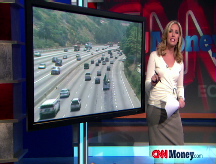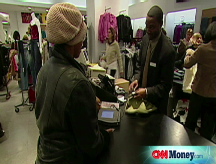Juice economy again? It's a tough call
Top Democrats are calling for more measures to stimulate the economy. But experts say it's too soon to tell whether another round of stimulus is a good idea.
NEW YORK (CNNMoney.com) -- In February, lawmakers passed a $168 billion program to juice the economy. And some say it's time to do it again.
The centerpiece of the first package: sending checks to consumers to spend as they saw fit. The effort did what it was supposed to do, at least somewhat: The government reported on Thursday that gross domestic product increased 1.9% in the second quarter, up from 0.9% in the first quarter.
But that was less than economists expected and the benefits from those rebates are likely to be more muted by the end of the third quarter.
Now leading Democrats on the Hill - and presumptive Democratic presidential nominee Barack Obama - are arguing that Congress should pass another stimulus package that could include anything from more tax rebates to increased food stamp payments to more spending on infrastructure, like bridges and roads.
A second package may be politically expedient - it's an election year, after all, and voters are distressed, so lawmakers feel the urge to do something. But fiscally, economists caution, it's not so clear that it's a good idea.
"It's a judgment call," said Brian Bethune, chief U.S. financial economist at Global Insight. "The case is nowhere near as compelling as it was earlier this year."
At the start of 2008 Bethune was forecasting a 70% chance the economy would fall into recession. Now, looking ahead to 2009, he's forecasting a 15% chance that the economy would be in recession.
Bethune believes the best way to stimulate the economy is through monetary policy. Since the end of 2007, the Federal Reserve has cut its key short-term interest rate to 2% from 5%. The problem, he said, is that it may take 6 to 18 months for rate cuts to fully stimulate the economy. "Ideally you don't want to use [stimulus measures], but they may be your only option if monetary policy isn't very effective." (Please see correction below.)
Bethune and other economists CNNMoney.com spoke with agree that a stimulus package won't prevent a recession or stop one already underway. The point of stimulus is to cushion the severity of a downturn, and it can serve as a catalyst for economic recovery. But timed wrong, it can spur inflation.
"The bold truth is there's nothing you can do," said Lakshman Achuthan, managing director of the Economic Cycle Research Institute. "You have to let the recession run its course."
The only way the recession will end is when the underlying problems causing the economic slowdown - the distressed housing market, credit crunch and rising fuel prices - are addressed.
"Fiscally, a second package could make sense if we knew it was going to be a long recession - until, say, the middle of 2009," Achuthan said. But "no one knows the answer to that today. While lawmakers are debating, it's possible the recession ends on its own or continues for another year."
That's what makes timing the stimulus tricky, Achuthan said. "You want it hitting before the recovery begins. The point of doing something is to create a recovery. Once a recovery starts ... you don't want stimulus because it's a waste of money and could be inflationary. You'd be stepping on the gas too hard."
To get a sense of where the economy is headed, Achuthan will look at the major drivers of the economy: housing, business and consumer confidence, the flow of credit and the direction of corporate profit growth. To date, all four have shown signs of slowing. "When you start to see them move up, then we're in a recovery," he said.
Mark Zandi, chief economist of Moody's Economy.com and an unpaid adviser to John McCain's campaign, thinks a second stimulus package will be needed. But, he said, nothing should be enacted before early 2009.
"Policymakers in office today should design it if needed when the next president is in office," Zandi said. "In early 2009, we'll have a better sense of what the backside of the [first stimulus package] looks like and we'll have a better sense of where we are in the housing downturn."
It should be noted that Zandi is not a spokesman for the McCain campaign, and Sen. McCain has not explicitly called for a second stimulus package. But Zandi said some of the candidate's tax proposals could be incorporated into a stimulus package. For instance, McCain has called for a doubling of the dependent exemption, which could be sent to taxpayers in advance, he said.
One economist who is firmly against having a second stimulus package is Brian Wesbury, chief economist at First Trust Advisors.
"Traditionally government deficit spending is supposed to help the economy," Wesbury said. But, he noted, with a forecasted record deficit of close to half a trillion dollars in 2009, "if that's not enough stimulus we have to look elsewhere."
Correction: An earlier version of this article incorrectly stated the Fed had lowered its key rate to 2.25%. ![]()







